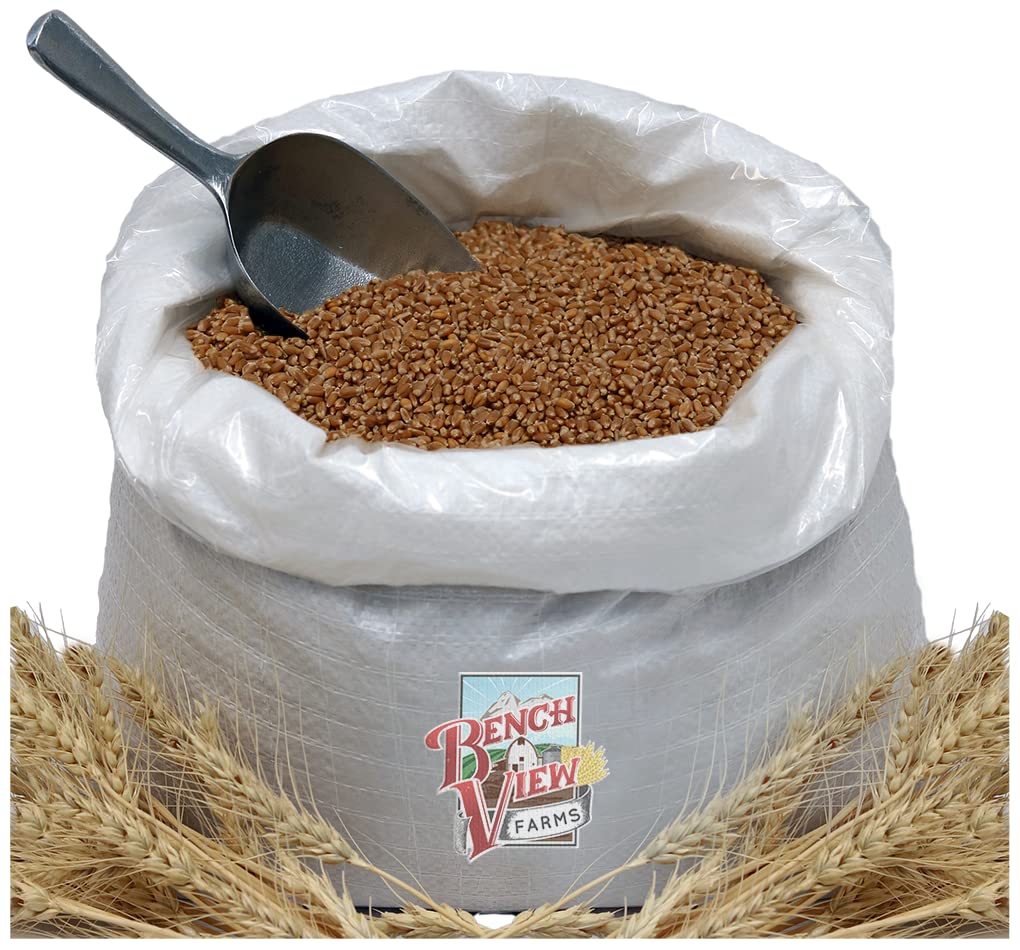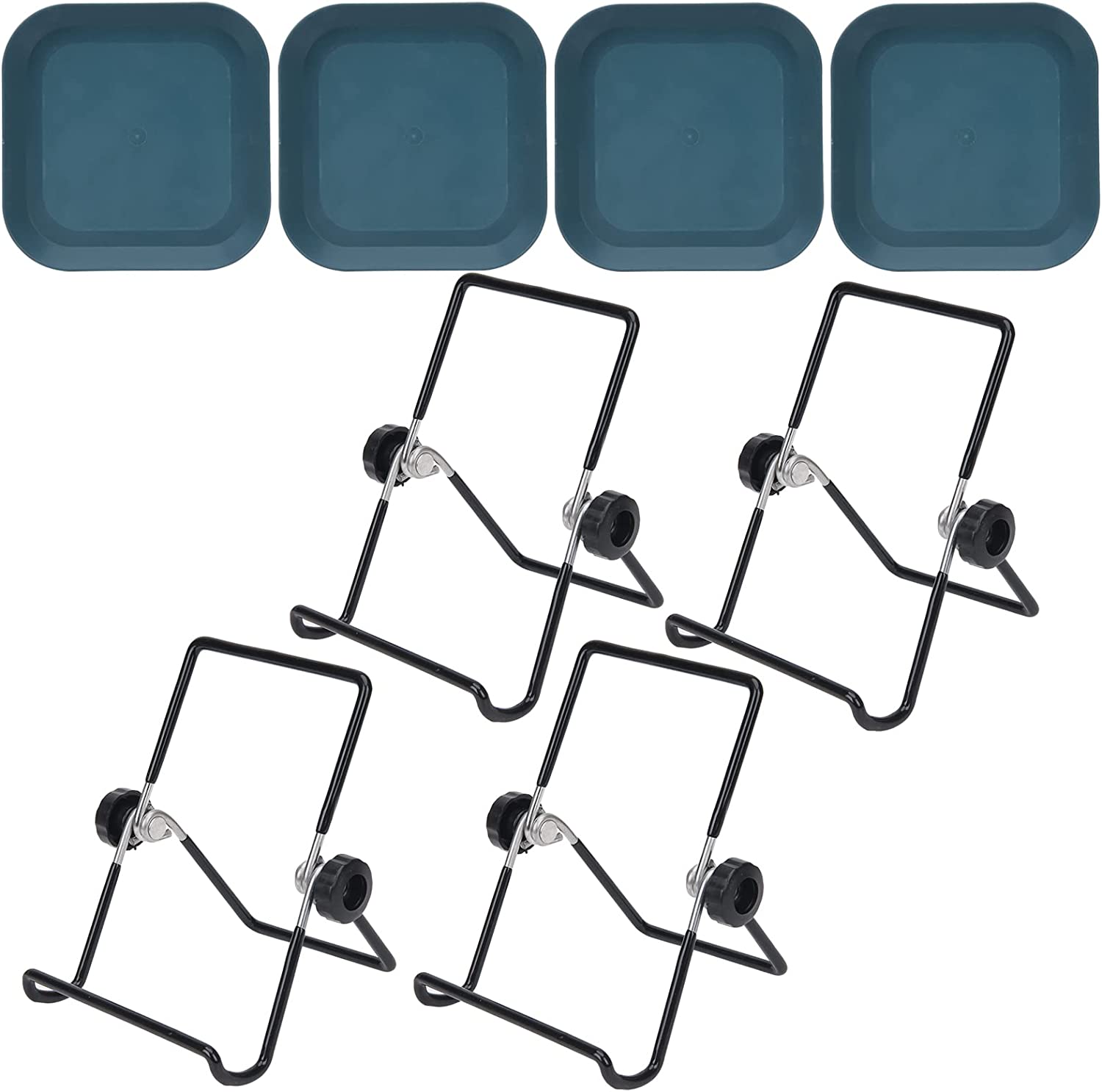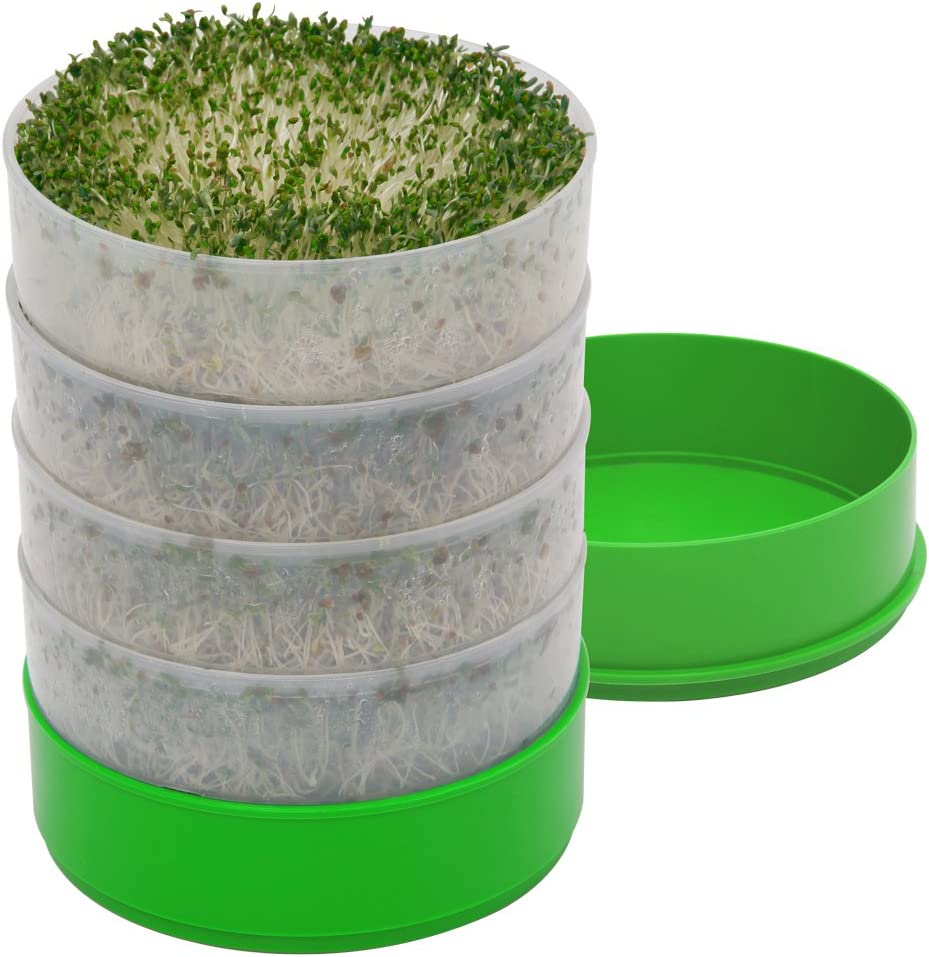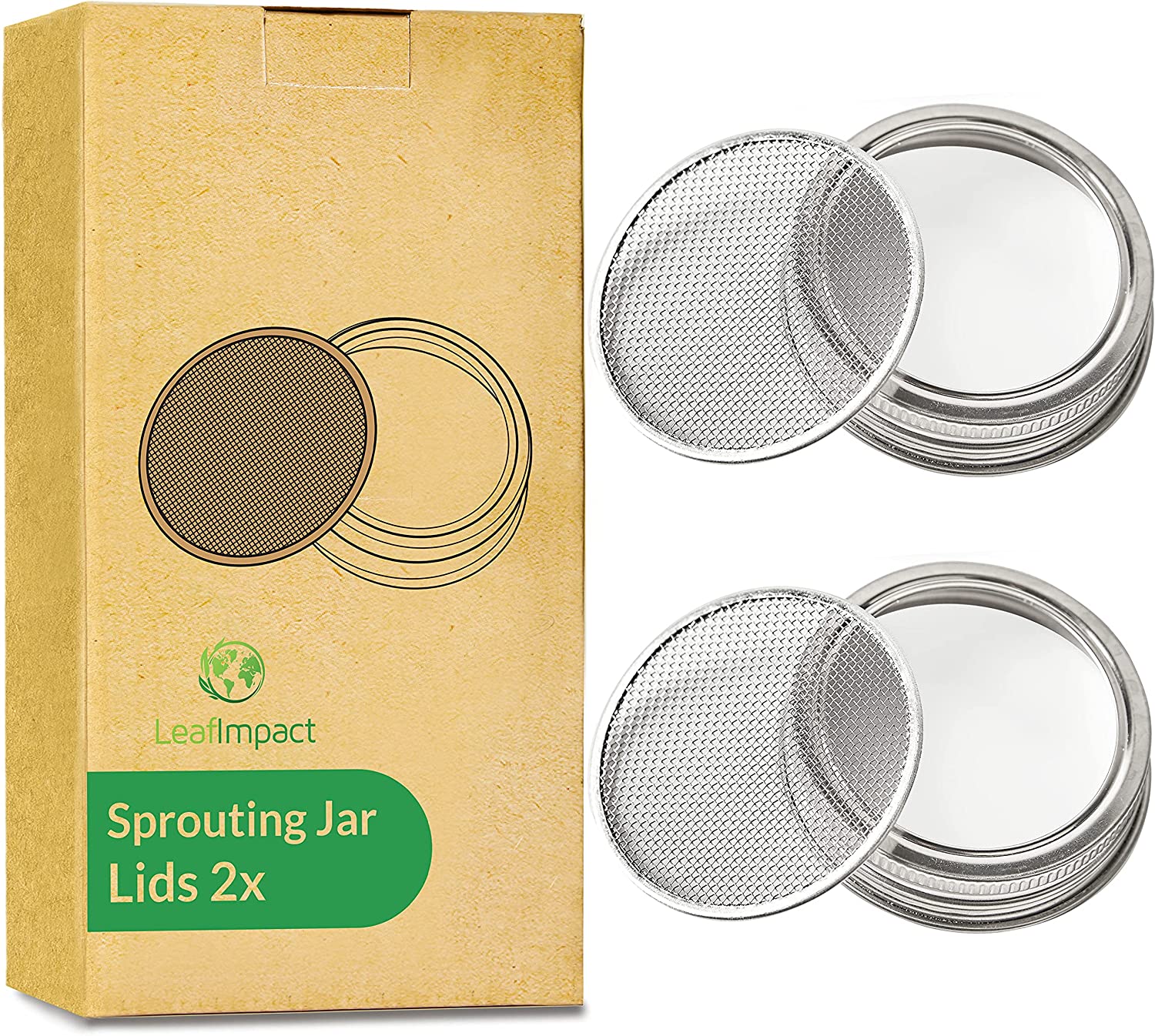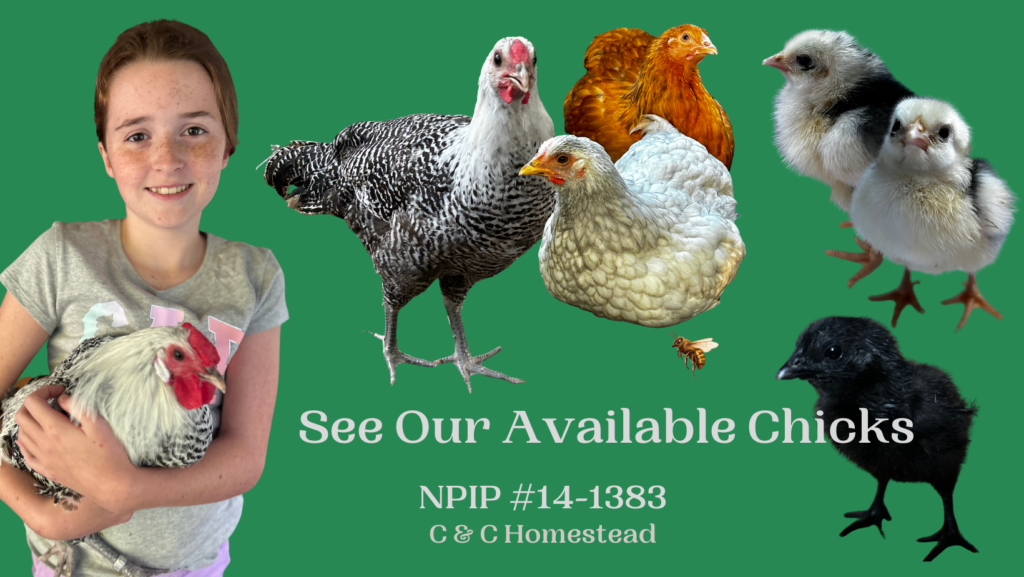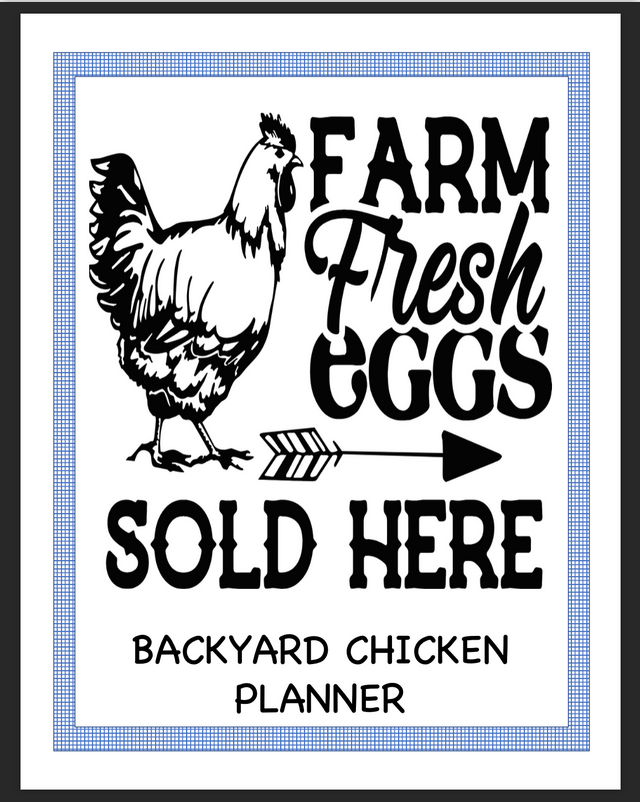Balancing Corporate & Homesteading Lifestyles
Five Ways to Get More Done With Less Work

Many people look at their workdays and wonder how they can get more done in less time. Although delegation and outsourcing may not always be an option, there are ways to get more done in less time and with less effort.
Getting More Done Quickly and Efficiently
One great way to get more done in less time is to stop. That’s right, stop! If you’re over-worked and stressed out, you won’t get nearly as much done and you’re more prone to silly mistakes and illness. Sometimes you need to take a break and completely separate yourself from work. You’ll find that taking a break is just what you need the most – even if it seems to be the opposite of what you should be doing. The best part: once you come back to the task, you’ll feel refreshed and more creative!
What Do Your Priorities Look Like?
You need to make an organized and frequently updated list of priorities. When you prioritize outstanding tasks, you’ll suddenly find that all of the work on your plate really is manageable. You can prioritize using letters or numbers so you clearly can see what needs to be done and when it needs to be done by.
Combining Similar Tasks
The next thing you need to do is combine tasks that can be done at the same time. For example, plan out your errands so they can all be done in one trip, instead of multiple trips throughout the day or week. When it comes to work, you can group similar tasks that require the same tools or resources so they can be done more efficiently. Since you have already organized your priorities, you’ll be more aware of what needs to get done, so you’ll be able to better combine similar tasks.
Getting Help
You can only do so much alone, so ask for help! You will be able to accomplish much more with less time and effort when you work with other talented people. You may be able to ask a colleague for help or even hire your own personal assistant from a freelance website like Elance. It’s not as expensive as you think!
Having an assistant can help you re-gain your time and save your energy so you can get the important tasks done. Give your assistant the trivial tasks and save yourself for the rest. You also may find it fun to have someone working with you on a shared task or goal.
Using the Power of Affirmations
Affirmations are another tool that can help you get more done with less work. These simple statements can help you maximize your time by focusing on the positive. For example, in moments when your work seems overwhelming you can say something such as, “Each simple, completed task propels me towards success.” Repeating these affirmations will give you a positive state of mind that just may be the extra push you need to get more done with less work and in less time.
Affirmation: One Of My Top Priorities Is A Balanced Life

I thrive when there is balance in my life. When all aspects of my life are given their fair share of attention, I feel like a complete person.
My spiritual life is important to me. When I give regular attention to my spirituality, I find it easier to make it through the challenges of each day. I realize that my inner strength is lessened if I neglect the spiritual part of my being.
My physical well-being is critical because it ensures that both my body and mind can work at their peak performance.
When I am in shape physically, I feel energized and my thoughts are clearer and more organized. I make better decisions when my body is in a healthy state.
I commit to making time for both work and enjoyment so one can balance out the other. I take pride in the feeling of accomplishment I get when I excel at my job.
I also allow myself enough time to relax and rejuvenate.
Reducing my stress lets me be at my best.
Today, I strive to pay close attention to the signals in my life. I commit to heeding those signals and acting accordingly so I continue to maintain a balanced life. I know I am more effective in each facet of life when all aspects are given their due share of attention.
Self-Reflection Questions:
- Do responsibilities ever get in the way of me achieving balance in my life?
- How can I encourage my loved ones to seek a balanced life?
- Does my idea of balance change as I encounter new experiences?
Affirmation: Developing A Positive Attitude Results in Positive Experiences

Each day, I see the benefits of maintaining a positive attitude. I realize that being positive results in better outcomes for me. When I am optimistic, it is easier for me to find solutions to challenges.
My mind is ticking with creativity because I am positive. I realize that when I look on the bright side, I can think clearly and accomplish more.
My relationships with those around me are stronger when I keep an open mind. I take the time to listen to their points of view. This approach results in better collaboration and mutual respect.
Keeping a positive outlook ensures that I avoid getting frazzled. When I feel frustration mounting, I remind myself that I am free to choose how to respond.
Being positive helps me to be patient. It helps me prepare to meet my long term goals.
I avoid allowing my lack of experience to prevent me from applying for new jobs. Even when I have less experience than other candidates, I believe in my abilities.
Every positive experience affirms that being positive is the best way to move forward.
Today, I vow to live a life full of positivity. I attest to the power of positive thinking because I see its impact on my life. I commit to encouraging others around me to live the same way.
Self-Reflection Questions:
- Why do disappointments sometimes cause me to lose hope?
- When the outcome to a situation is unfavorable, how quickly am I able to find an alternative?
- How does having a positive attitude help to develop other positive traits in me?
9 Ways To Overcome Negative Thoughts And Think Positively

Negative thoughts are like a cancer to your spirit. They slowly eat away at you until there isn’t enough left to support your hopes and dreams. Negative thoughts are damaging because they affect everything that comes afterwards. This includes your decisions, goals, actions, and results.
Negative thinking can impact every area of your life. It limits your effectiveness and poisons your outlook on life. If the time you have to spend on self-development is limited, dealing with your negative thinking is good way to allocate your time.
Take control of your thinking and be more positive:
⇒Avoid thinking of yourself as a victim. When you have the mindset of a victim, you’re dooming yourself to a plethora of negative thoughts. A victim has neither hope nor options. There are always ways to move forward. You have choices.
⇒Recognize your negative thought patterns. Your thoughts can be just as habitual as your morning coffee or your cigarette break. Notice your repetitive thoughts and when they occur. The first step to changing these thought patterns is to catch them when they first begin. When you notice negative thinking, change your thought.
⇒Either think a positive thought or redirect your thinking and focus to whatever you’re doing at that moment.
⇒Read positive quotes each day. If you can’t find the time to read a book, at least read a few positive quotes each day. You can buy calendars with positive quotes. There are also plenty of websites with quotes on a wide variety of topics.
⇒Keep your mind in the present. Sure, you can look ahead, as needed, to make plans. But your thoughts should remain rooted in the present. Thinking about the past results in frustration and regret. Thoughts of the future can cause anxiety. Keep your mind on your current surroundings and task
⇒There’s no reason to worry about the next step. Take care of the current step first.
⇒Ask yourself, “Do I know for certain this is a fact? Or is it just my opinion?” You don’t know as much as you think you do. You make a lot of assumptions based on faulty knowledge. This can lead to the belief that a situation is less solvable than it really is. If you don’t have accurate beliefs, you’re already at a huge disadvantage.
⇒Avoid the idea that perfection is possible. Expect that you won’t be perfect at anything. When perfection is the goal, you’ll always fall short and that opens the door for negative thinking.
⇒Spend time doing something that makes you feel good. It’s easy to have positive thoughts if you’re doing something enjoyable. Spend time with your partner or a good friend. Make a list of things you like to do and spend some time each day doing at least one of them. Enjoy yourself each day.
⇒Meditation seems to be a cure for everything. It’s one of the best ways to learn more about your thought patterns. It’s also an effective way for learning to focus and direct your thoughts.
⇒Make a list of affirmations and take control of your self-talk. Instead of inventing positive self-talk on the fly, have a list prepared of positive things you can say to yourself. Build your self-talk around your goals and kill two birds with one stone.
Are your negative thoughts impacting your results and future? Negative thinking is a challenging habit to defeat. Monitor your thoughts and defeat negative thinking before it can take root. Replace those negative thoughts with a positive alternative. Make an effort to spend some time each day enjoying yourself.
Little by little, you’ll find that you’re spending more of your time thinking positively, and your life will take a turn for the better.
Are You A Victim Of Circumstances Or A Victim Of Your Own Thinking

Your inner world has a tremendous impact on your circumstances. Your beliefs affect your thoughts, emotions, and actions. Your actions ultimately create your life. Interestingly, many of your beliefs are unfounded, and your thoughts and emotions are largely habitual. Changing any of these internal components will affect the results you experience.
Fortunately, your inner world is under your control, though making changes can be challenging.
Change your mind and your life will follow:
⇒Start and end your day by experiencing gratitude. It’s easy to focus on what you don’t have. Instead, spend a few minutes in the morning and before bed to list your blessings.
⇒By focusing on the positive, you’ll brighten your mood and increase the number of good things that come into your life.
⇒Focus on solutions. It’s a mistake to spend your time focusing on your problems. It makes you feel terrible and hopeless. It also fails to rectify the challenge you’re facing. When something is going wrong in your life, switch into solution-finding mode.
⇒What can you do to make a positive change? You have far more options that you realize.
⇒Take care of your body. One of the common causes of depression has been found to be undiagnosed heart disease. When your body is out of sorts, it skews the way you interpret the world. We are guided by our feelings, and when your health is compromised, your emotions can be misleading.
⇒Stay grounded in reality. Most of us live in a fantasy-land. We’re thinking about the past or speculating on the future. However, if you concentrate on living wisely and well in the present moment, the future will bring the joy you hope for.
⇒Remember that life is whizzing by 24/7. The actions you take right now determine your future. You can’t act today if your mind is elsewhere.
⇒Use positive affirmations. Give yourself the gift of positive thoughts and uplifting self-talk throughout the day. Negative thoughts lead to negative emotions. Positive thoughts will fill you with positive emotions. With positive thoughts, you can change your world.
⇒Examine your beliefs. Make a list of the beliefs that are holding you back and then question them. Where did you get this belief? Why do you believe it’s accurate? Is there a possibility that this belief is false? How much evidence do you really have in support of this belief?
⇒Track your thoughts. Set an alarm, perhaps on your smart phone, to notify you each hour. When the alarm sounds, consider how you’ve used your mind over the previous 60 minutes.
⇒What did you think about? Was your attention focused on your work, or did you worry about the cable bill? Did you use your mind to better your future?
⇒Measuring yourself each hour will help you to stay focused. It’s too easy to fall into old patterns if you only check yourself once per day.
⇒Learn to meditate. Meditation has many physical and mental benefits. It can reduce stress, strengthen your health, help to strip away your erroneous beliefs, and bring you clarity and focus. Meditation is one action that can have a huge, positive effect on your life. Incorporate time for meditation into your schedule each day.
Most of us believe we’re victims of our circumstances, but we’re actually victims of our own thinking.
No matter how bad your situation might be, someone has started with an even worse situation and led an incredible life. Changing your inner world is the key to changing your outer world.
Discovering the Hidden Secrets of the Law of Attraction

There's a pretty good chance you've heard something about the Law of Attraction in the past few years. For a while, it was pretty big news, and lots of people who wanted better lives jumped on the bandwagon.
While you're not hearing as much about it in the media these days, the Law of Attraction still holds true. Just what is the Law of Attraction, and how can it work to help you be happier and more successful?
What is the law of attraction?
The basic rule of the Law of Attraction is that like attracts like. When you're in a healthy, successful mindset, you'll be healthier and more successful. Positive thinking is a powerful tool as long as you use it correctly. So how do you do it?
Here are some ways you can use the Law of Attraction to make your life more fulfilling and achieve your goals:
⇒Visualize what you desire. You need to have a clear idea of what you want out of life, not just a general or vague picture. By envisioning every detail of your desire, you'll eventually receive it!
Know exactly what your goal is and outline the path for getting there.
Then track your progress. You'll be surprised at how much of a difference this makes!
⇒Allow yourself to succeed. You may think this sounds silly. After all, you're not the one holding yourself back – or are you? Many of us keep ourselves from the success we hope for, whether it's because we feel like we don't deserve it or we're just not paying attention.
Take a look at your life and ask yourself if you have behavior patterns or attitudes that keep you from taking advantage of opportunities that can help you succeed. Recognizing and being aware of these self-sabotaging attitudes is a big step toward change.
Do you consistently do something that sets you back every time you’re on the verge of achieving a goal? Forming a mindset that will allow you to be a success can make a huge difference.
⇒Have focus. It's easy to have many desires at once. For your best results, work on one or two things at a time and give them your full attention. Without the ability to focus your energy and thoughts on your goal, the chances of failure and distraction go up.So if you find yourself pursuing multiple goals but never get near any of them, it's time to focus. The Law of Attraction tells us that in order to achieve, we have to be in a clear, focused mindset, with a strong picture of a single goal.
Once you've focused on a single goal and achieved it, you can turn your focus to your next goal. This way, one by one, you are realizing success.
⇒Be willing to receive the bounty the universe offers you. The world is constantly giving you chances to make things better. If you maintain the right mindset, stay focused, and know what you want and how to get there, you’ll reap the benefits of those opportunities.
Every day there are opportunities that could lift you out of the rut and put you on the road to a better tomorrow. You just have to be willing to take advantage of them.
The Law of Attraction principles have helped many people change their lives for the better. Keeping a positive mindset and taking action to accomplish your goals will help you achieve the life you’ve always dreamed of.
Growing Sprouts: A Flock Favorite
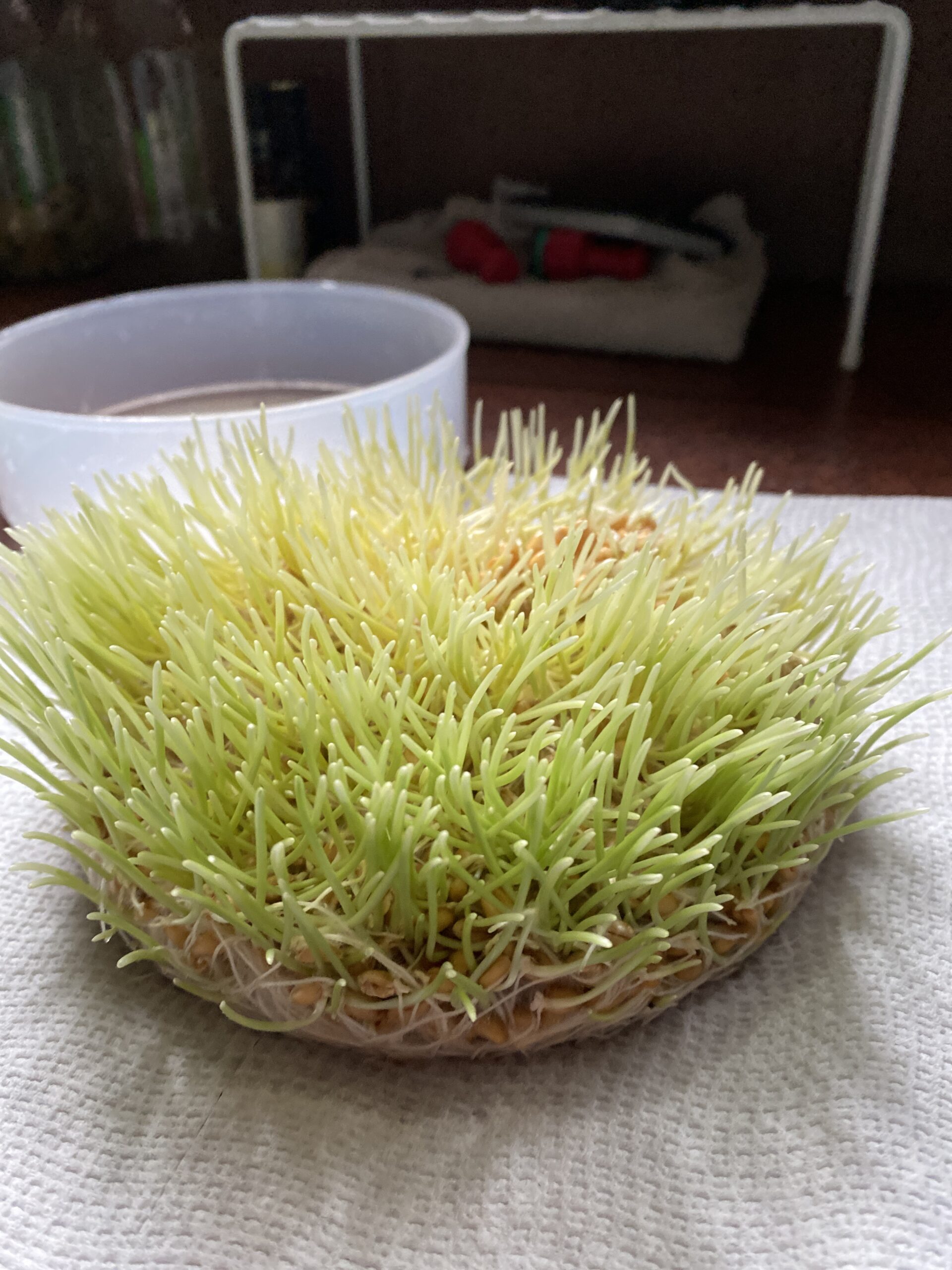
With the winter cold coming and no more grass until spring, I like to provide my flock with sprouts throughout the winter. Wheat berries are one of their favorites! These are one well-balanced and nutritious food to include in a chicken’s daily diet!
Here's why: Wheat berries are the least processed form of the plant, and they generally retain most of their nutritional value. Wheat berries provide a balance of protein and macronutrients and contain methionine, an amino acid that is important for a chicken's growth.
Wheat berries have a high fiber content that helps chickens with digestion too. The fiber also slows down the absorption of sugar, preventing unhealthy blood sugar spikes.
And the benefits don't stop there, they also contain calcium and phosphorus, which are needed for bone formation. Lastly, wheat berries have high vitamin C levels, which promote iron absorption.
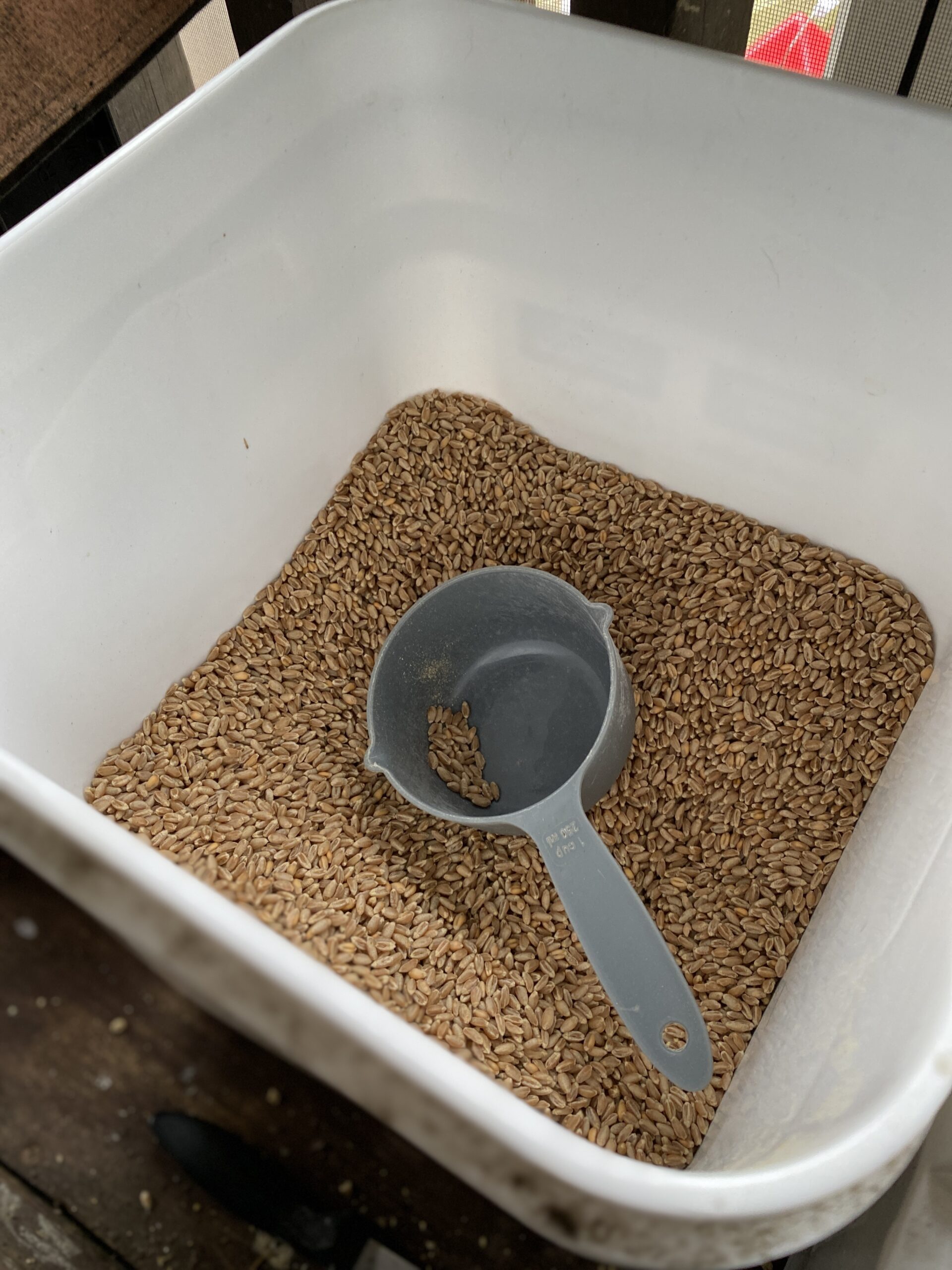
Ever since I started with chickens, friends and family love sharing posts and chicken tips with me. Facebook loves to share too since the algorithm picked up my interest in chickens.
My daughter shared an interesting post on wheat berries, and after a little research on my own, this was something I wanted to add to my chickens' diet ... and they LOVE it!
There are multiple ways to feed wheat berries ... dry, soaked, or sprouted. Since my flock gets scratch grains too, I decided it would work best to sprout them for the highest nutritional value.
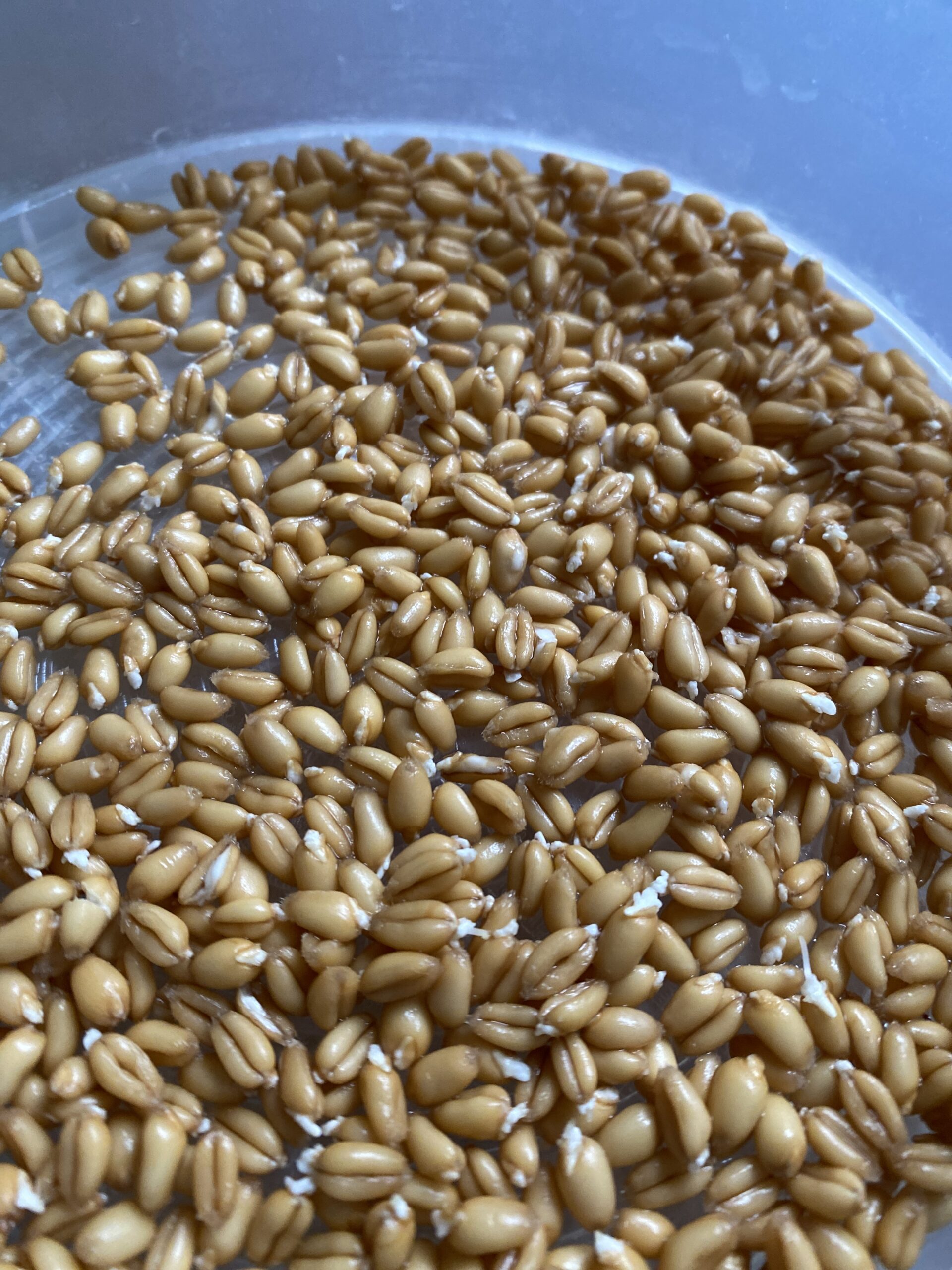
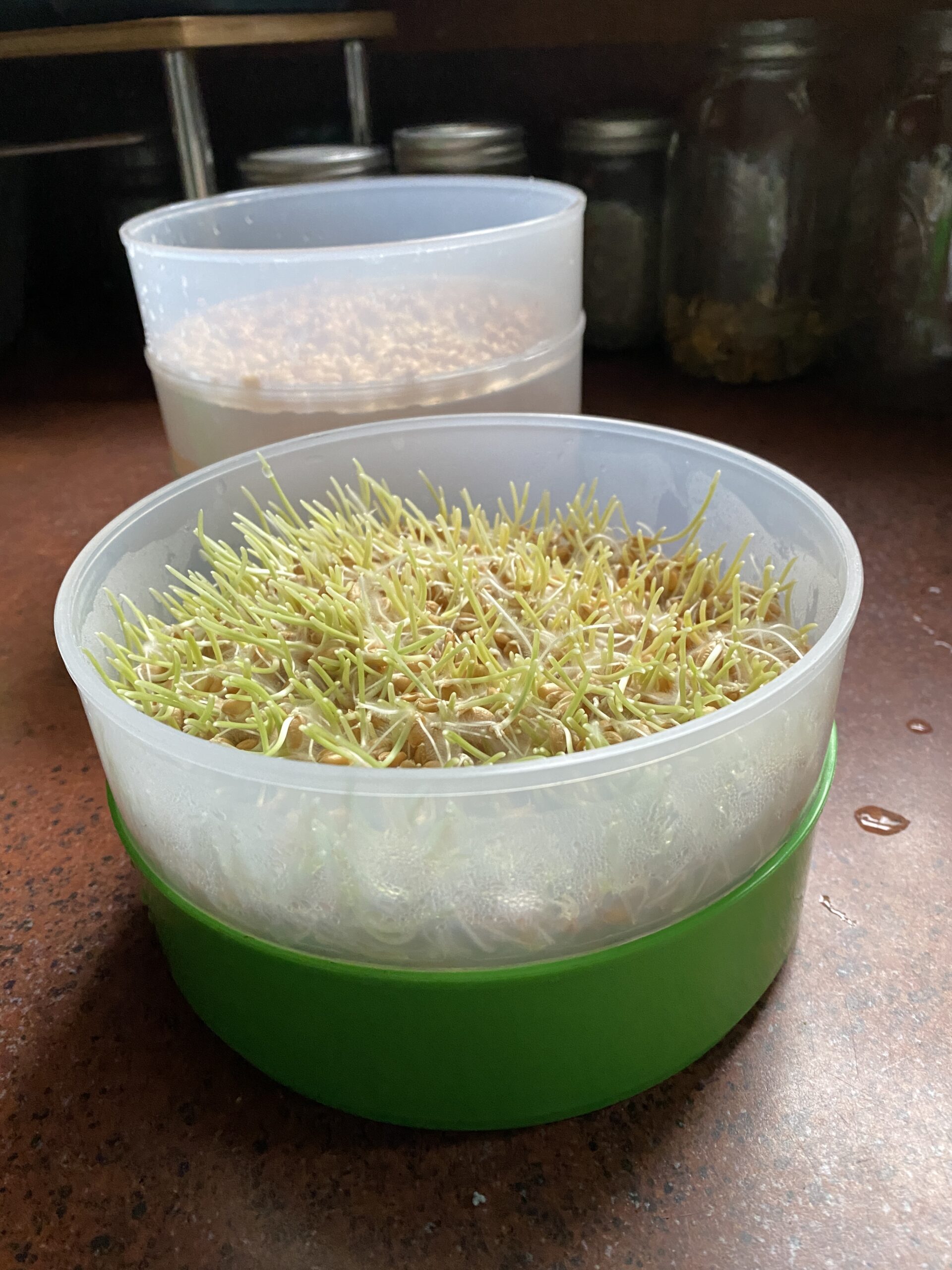
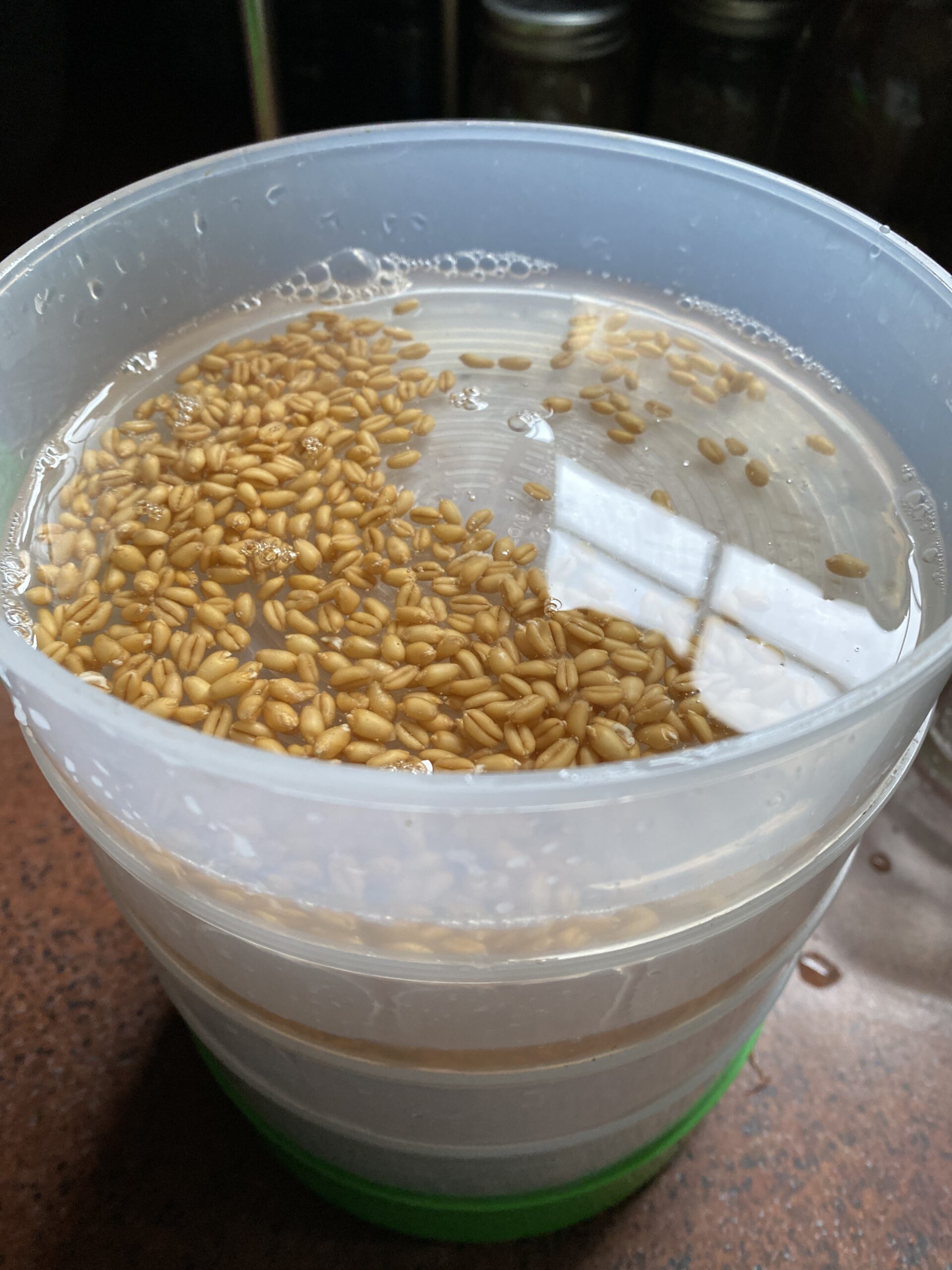
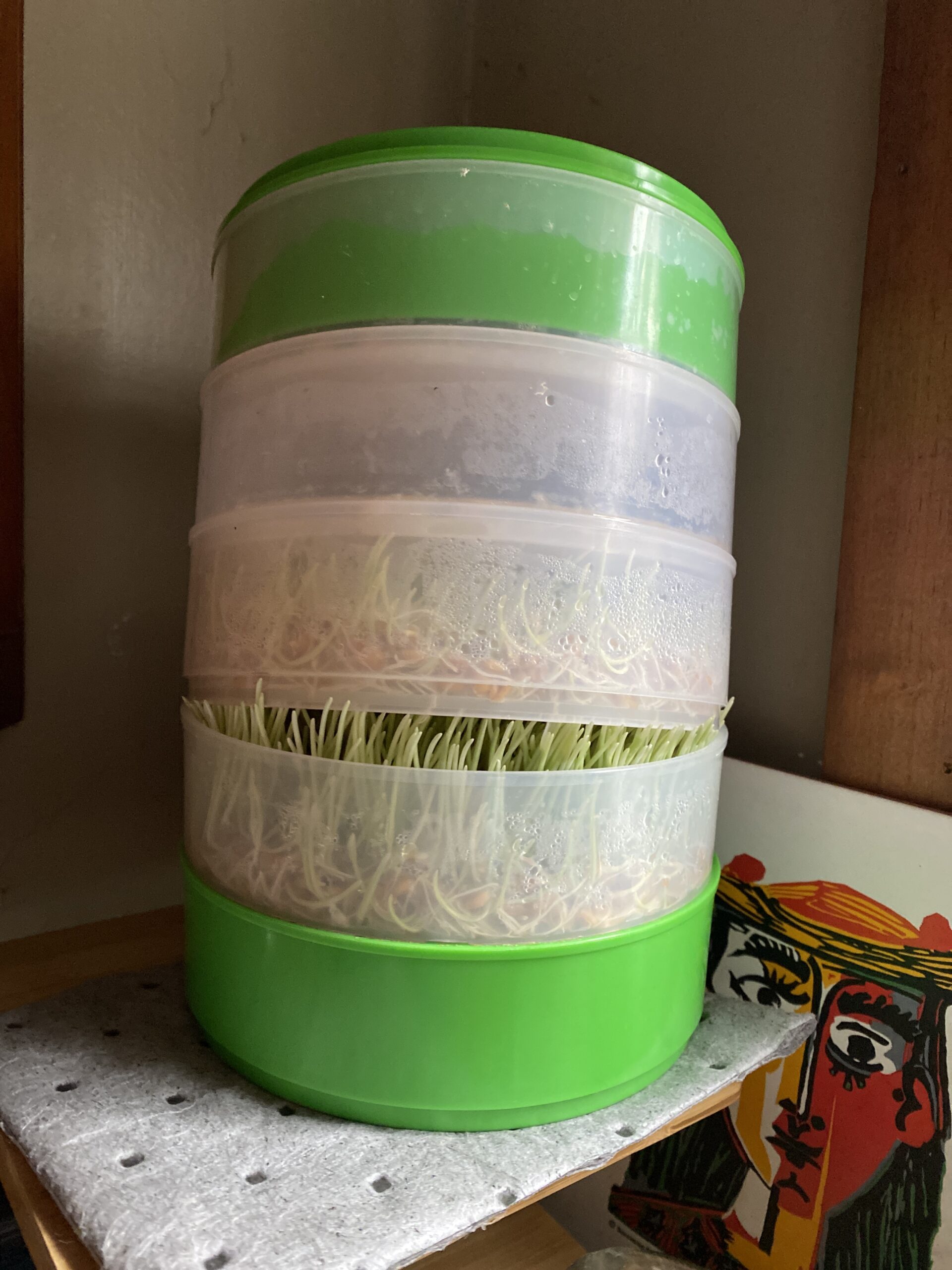
In addition to the wheat berries, I also sprout alfalfa. On most days the flock gets a mix of both now that I have the sprouts on a perfect schedule. The 4 tray system for the wheat berries works like a clock ... and those buggers grow fast. As you can see in the far right photo, they are pushing out of the tray ... they were in there nicely this morning but were popping out by the afternoon ... just in time for the flock's afternoon treat.
Our feeding schedule: Out of the coop and breakfast (fermented grains) by 7:30 am. Sprouts at 2 pm and a little scratch at 3:30 pm before bedtime. This late snack gets their metabolism going to help keep them warm on the cold winter nights.
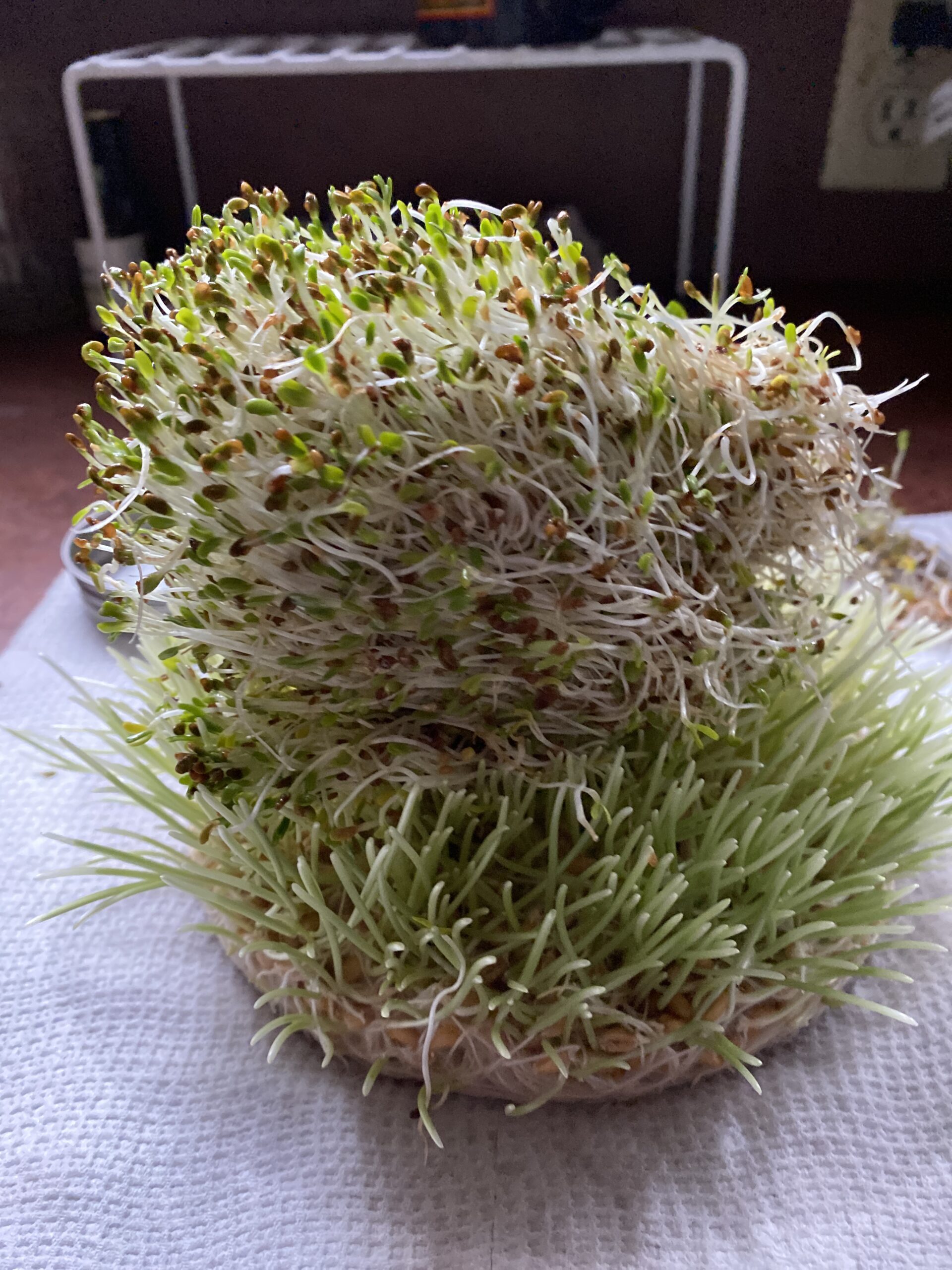
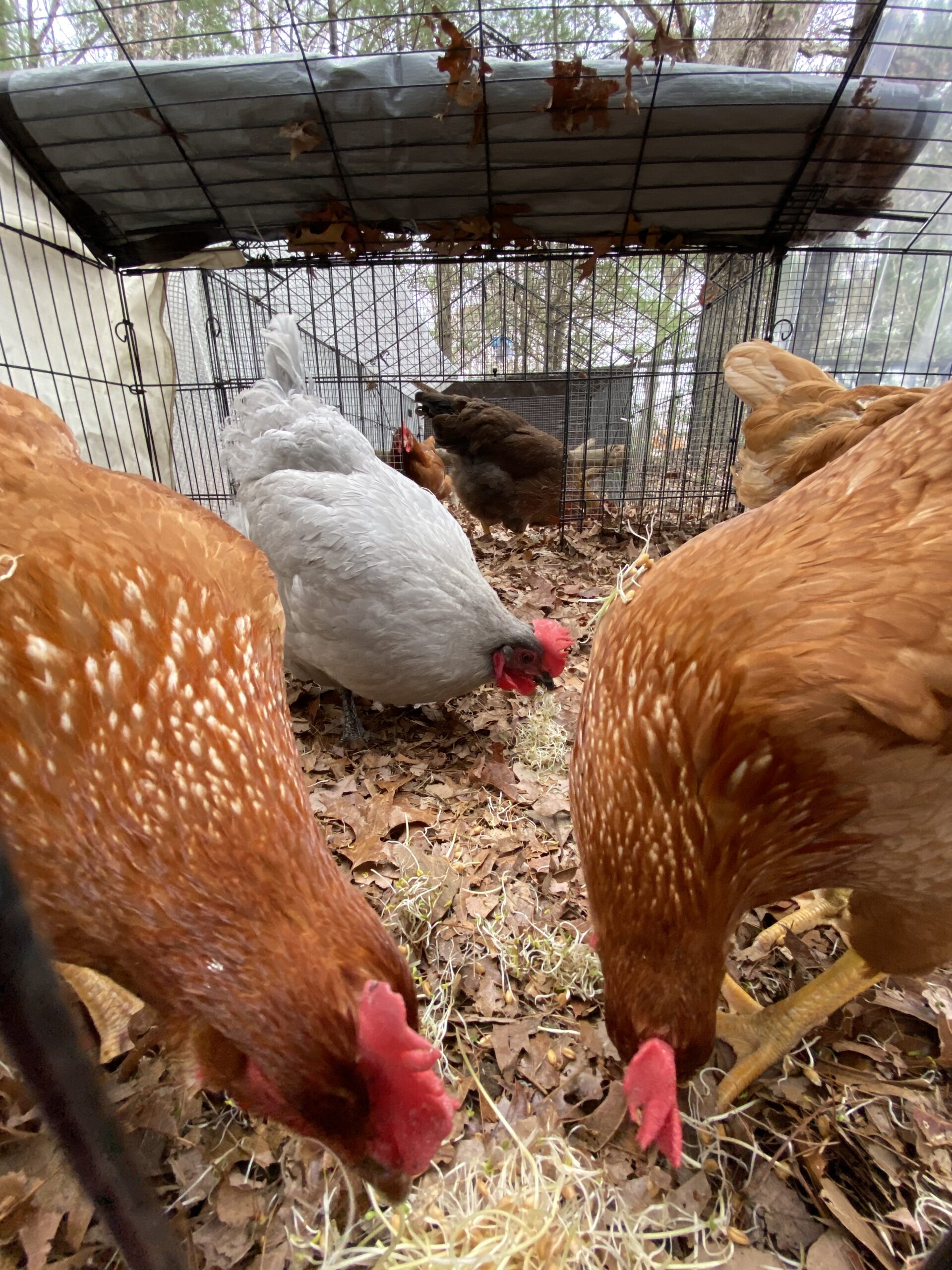
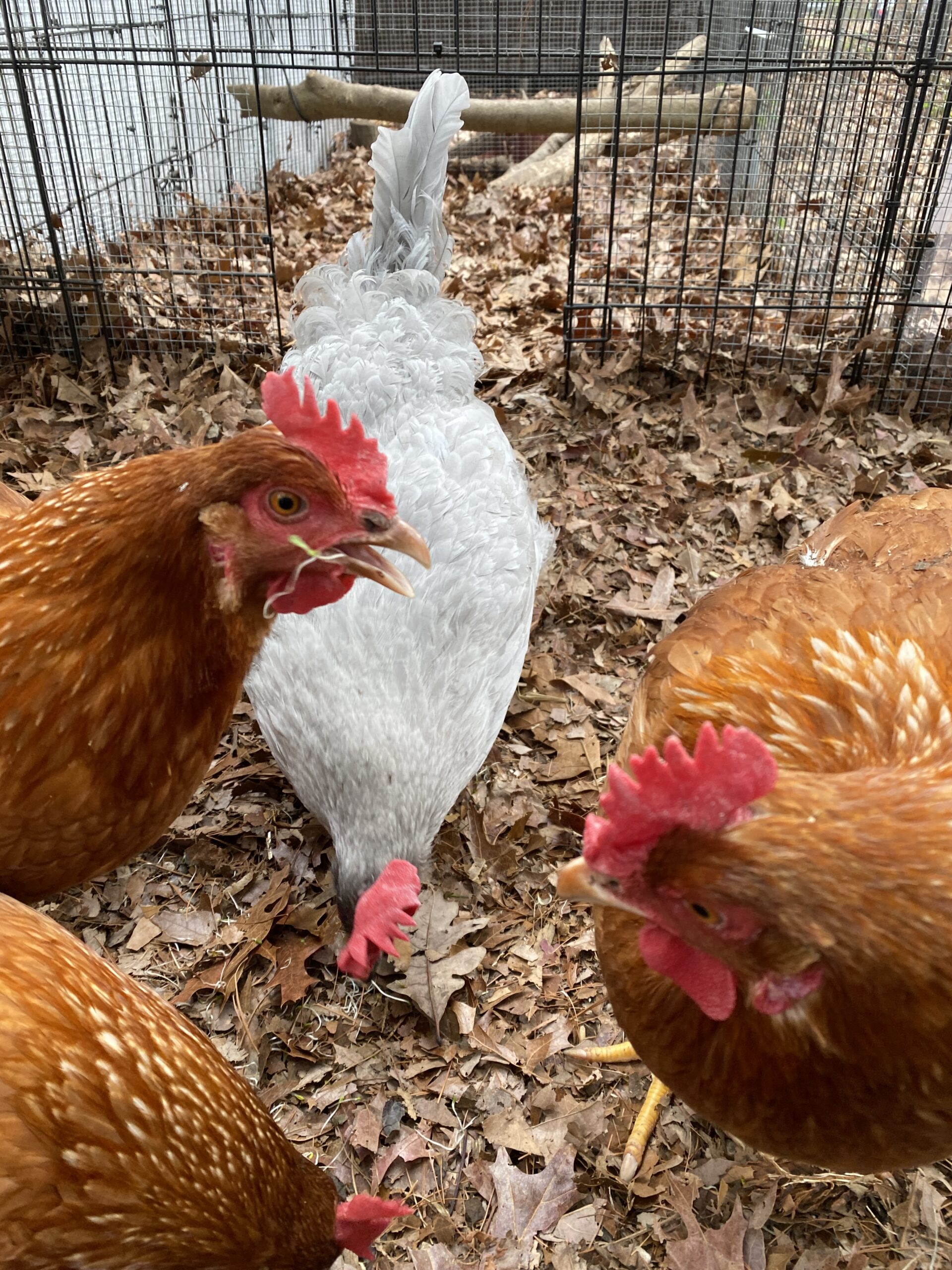
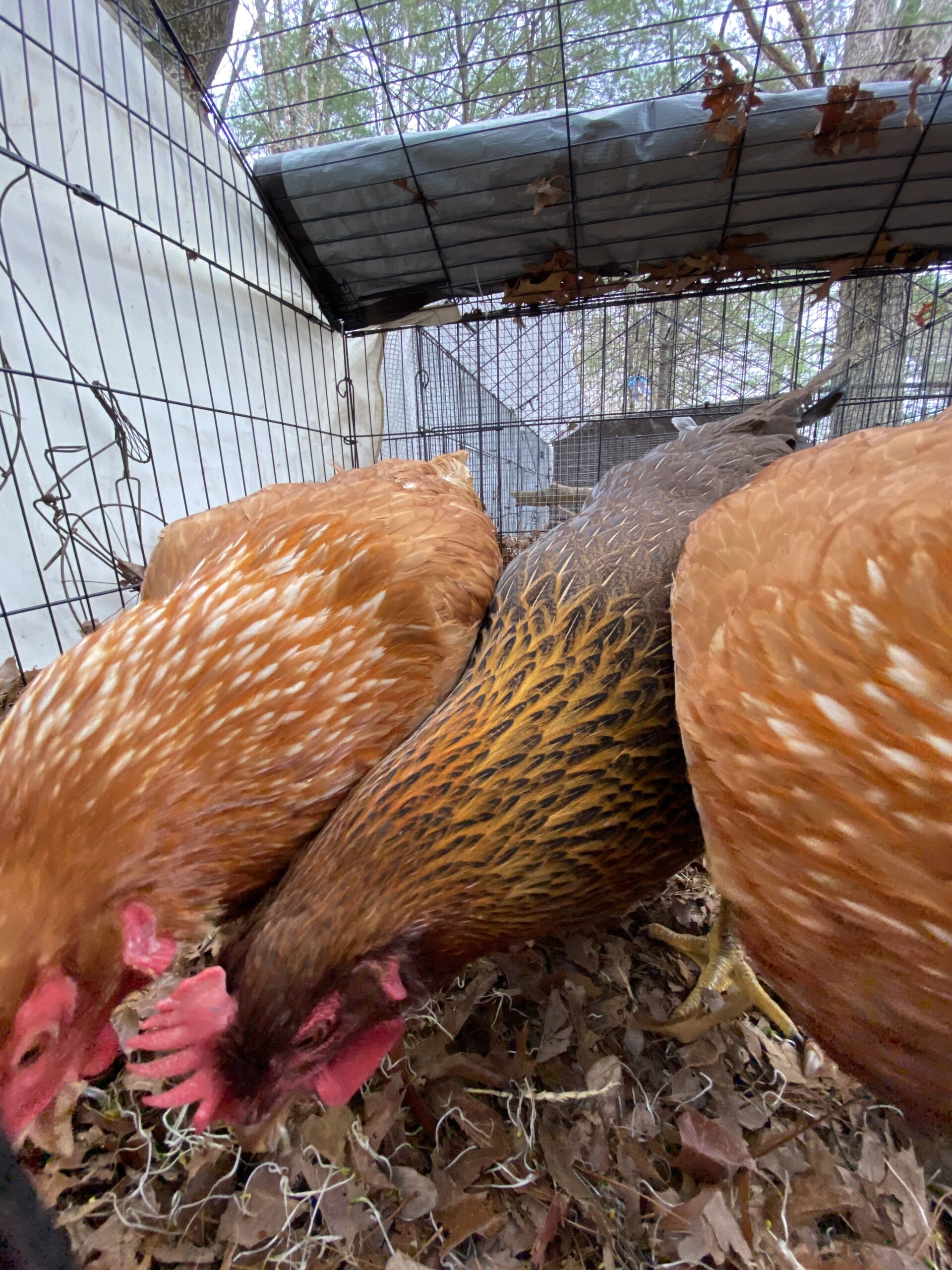
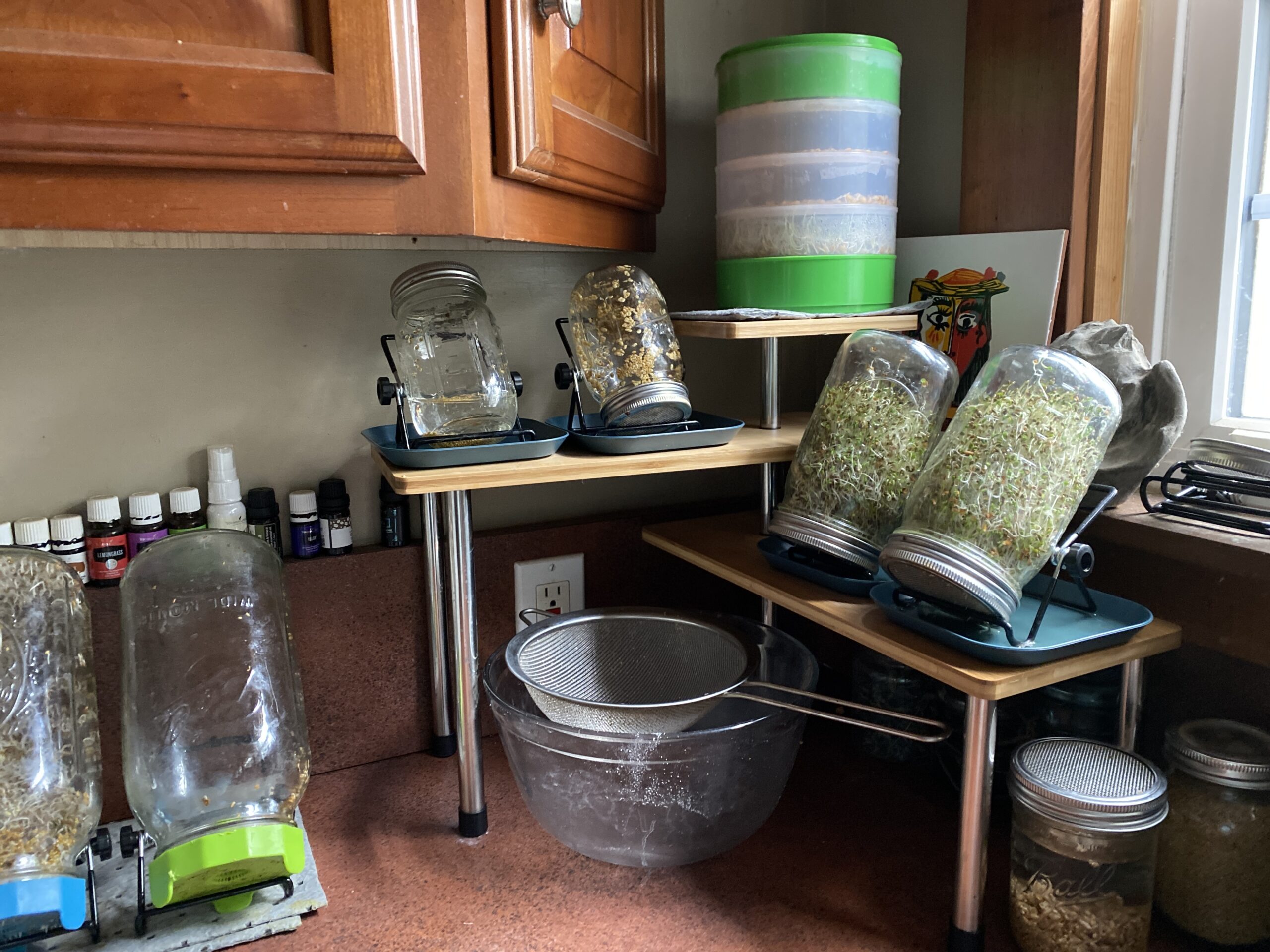
To sprout wheat berries or alfalfa, soak them for 24 hours then put them in a sprouting tray or mason jar. Water daily and after 4 days, they should be ready to go.
As an alternative, you can sprout your chicken's scratch grains. We use Hen Up Scratch Grains.
On the left is my set up for my sprouts.
Below are the products that I use. These are affiliate links and I may receive a small commission (at no extra cost to you) if you choose to purchase from one of my links.
Organic Hard Red Wheat Berries - 48lbs
These are the wheat berries that I buy from Amazon (this is an affiliate link)
Sprouting Trays & Stands (lids & mason jars not included)
These are the stands & trays that I use for alfalfa sprouts
Sprouting Tray System
This sprouting tray system works very well with wheat berries & I prefer over jars.
Sprouting Lids for Mason Jars
I use these lids for my mason jars with the sprouting trays & stands.
Tips To Stay Healthy During The Winter

How do you stay healthy during the winter?
The long, winter months and short days can increase your risk of getting sick. However, there are many things you can do to stay healthy, even when it’s cold outside and many around you have the flu.
Try these ideas to maintain your health in the winter:
Continue to exercise. It’s common to avoid exercising in the winter. When it’s snowing or freezing rain covers your driveway, it may be tempting to stay home under the covers. Instead of hiding from the elements, find unique ways to stay active.
⇒Exercise can boost your immune system and keep you healthy during these cold months. Exercise will also improve your mood, give you energy, and help you sleep.
⇒Try exercising indoors if the winter weather is harsh or go to a gym near you.
⇒Another option is to use winter activities as exercise. You can get a cardio workout by shoveling the snow and building snowmen. You can also get a great workout from skiing or sledding.

Get more vitamin D. Your body makes vitamin D when it’s exposed to sunlight. This vitamin regulates many processes in the human body, including your genes.
⇒When you don’t have enough vitamin D, you may get bone pain, heart disease, depression, muscle weakness, dementia, arthritis, and other health issues. This deficiency can also increase the risk of cancer.
⇒It’s harder to get vitamin D from the sun during the winter, so it’s important to make an effort to spend more time outdoors.
⇒Another option is to take supplements and eat foods with vitamin D. Fortified milk, cereals, and orange juice have extra vitamin D. Eggs and mushrooms are also good sources of this vitamin.
Wash your hands. You need to wash your hands all the time, but it becomes especially important in the winter months.
⇒One of the reasons more people get sick in the winter is because they’re indoors more, and they can’t open the windows or doors to circulate the air. This allows germs to build up in the air and spread easily. Spending more time indoors with others exposes you to more illness.
⇒Wash your hands with soap and water frequently. If you find that this dries out your skin, use moisturizer immediately after washing your hands.
Pay attention to your diet. What you eat affects your health. Nutrition sometimes suffers during the winter because fruits, grains, and vegetables can become more expensive and may be harder to find in parts of the country.
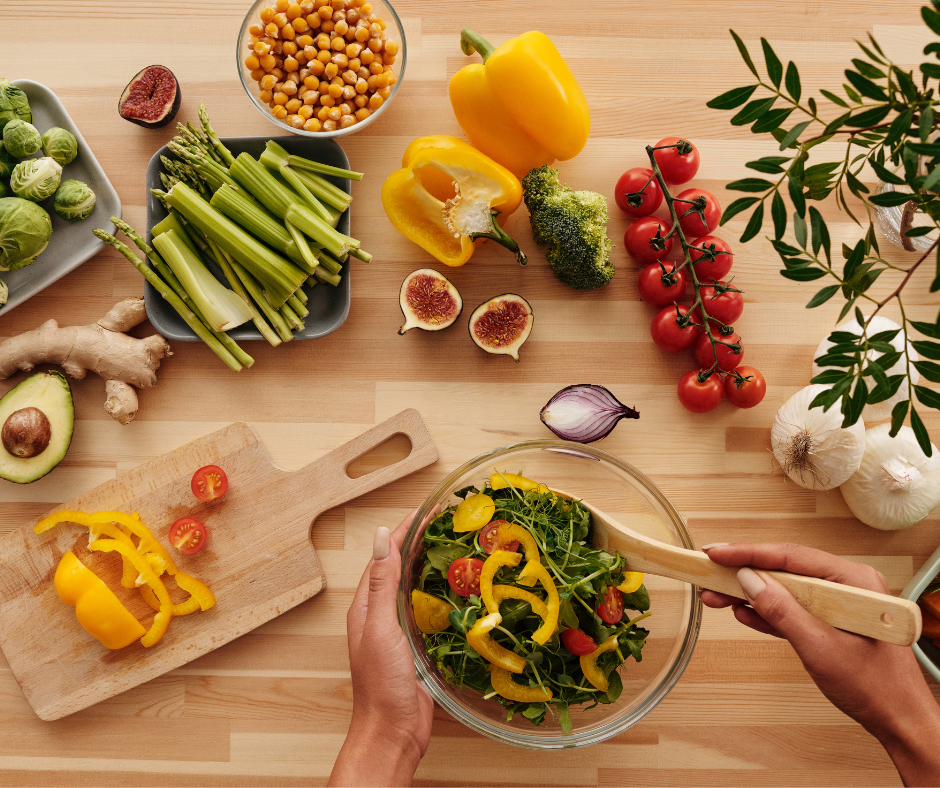
⇒You may also be tempted to eat more comfort food, such as mashed potatoes and gravy, because of the colder weather. Try to limit comfort foods with high fat, sugar, or salt. Instead, consider making healthier versions of your favorite meals.
⇒Fruits and vegetables have important antioxidants and other nutrients that can help your immune system and prevent some illnesses. So, you want to ensure they’re still part of your diet in the winter.
⇒In addition, you tend to wear more clothes in the winter, and may not notice body changes, so gaining weight can become an issue. Pay attention to the total number of calories you’re consuming each day. Read labels and measure portions. Avoid turning to junk food or snacks.
Winter doesn’t mean you have to get sick. Try these simple tips to maintain your health even in the colder months.
The A to Z Guide to Becoming More Optimistic

Studies show that optimists live longer, achieve more, and enjoy greater happiness and health. Even if you tend to see the glass as half empty, you can tap into these advantages.
Psychologists believe that about 50% of your optimist quotient is determined at birth. That leaves the remaining 50% that you can work on.
Train yourself to become more hopeful. You can complete most of these steps instantly, and a few require a little more time.
Instant Changes for Becoming More Optimistic
- Wear a smile. Your facial muscles communicate with your brain. Putting on a smile will make you look and feel more cheerful.
- Create a distraction. When you find yourself dwelling on the size of your thighs or how slowly traffic is moving, switch your attention to something more entertaining. Sing show tunes or remember romantic moments with your spouse.
- Study your dog. Most dogs will keep returning to the spot on the sidewalk where they found a burger wrapper last June. Let your best friend inspire you to hold on to your dreams.
- Count your blessings. Gratitude reinforces optimism. Wake up each morning thinking about what you’re thankful for. Write a gratitude list and post it near your desk where you can see it all day.
- Challenge your assumptions. Transform your self-talk by arguing the opposing side when you start to criticize yourself. Remember to run a reality check because unpleasant events tend to make a stronger impression than positive ones. The day your hot water heater broke stands out more than all the years it worked fine.
- Build on your strengths. Studies also show that using your core strengths will cause you to view your future more favorably. If your friends rave about your watercolors, enter a group exhibition. Apply your aptitude with numbers to tutoring children in math.
- Focus on solutions. Put your energy into overcoming challenges rather than catastrophizing about how much can go wrong. Needing a new car transmission will seem less overwhelming when you take your first steps to find a mechanic and adjust your budget to cover the bills.
- Exercise daily. Physical activity is good for your mind as well as your body. A vigorous workout will brighten your outlook. Play competitive sports or sign up for a dance class.
- Practice mindfulness. Trying to make yourself happier tends to backfire, but there is a better way. Engage fully with whatever you’re doing. As you increase your awareness and act from your heart, even tedious tasks become more meaningful and rewarding.

Longer-Term Changes for Becoming More Optimistic
- Marry an optimist. Hope is contagious. An idealistic spouse sets a good example and encourages harmony. If neither of you is optimistic, you and your partner can work on becoming more optimistic together and find friends who will be good role models.
- Adjust your explanatory style. When optimists receive disappointing news, they usually view it as temporary and attribute it to external causes. Lighten up if you’re taking the weather personally and remember the rain will end. It’s good to hold yourself accountable for behavior you can change, but avoid beating yourself up.
- Plan ahead. Feeling in control also helps to boost optimism. Clarify your goals and strategies to makes it easier to anticipate obstacles and persevere. As your successes add up, the process will become more automatic.
Wear rose-colored glasses and walk on the sunny side of the street. Being more optimistic is likely to extend your life and help you to enjoy those extra years more.
Affirmation: I Am Full of Hope and Expectations

Joyousness is the order of the day for me. I expect wonderful blessings.
Having a positive mindset sets the stage for my life. When I keep my mind from doubt and anxiety, I allow myself to enjoy my reality.
There is very little space in my life for worry. When I choose to expect only positive outcomes, that is exactly what I receive. Although what happens is sometimes different from what I expect, there is still enough to give thanks for.
Setting goals starts with positive anticipation.
Although the path towards a goal may be unclear today, I expect it to reveal itself in due course.
My approach is to prepare myself for my wishes and desires to become reality. I do that by remaining humble and driven at the same time. When they come my way, I know how to handle them. I use those realized dreams to further enhance my hopefulness.
Today, even the most trying circumstances fail to dampen my spirit. I know that even when things go in an unexpected direction, the onus is on me to continue along a positive path. My heart and soul are ready to receive goodness and light.
Self-Reflection Questions:
- In what ways do I prepare myself to receive the things that I work hard for?
- When is it okay for me to feel disappointed with the outcome of a situation?
- How valuable is hard work and determination in allowing me to be successful?
